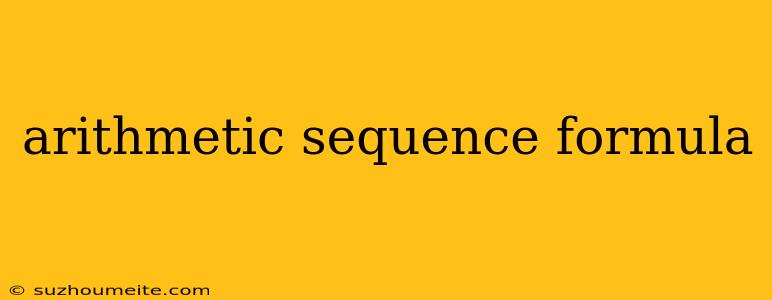Arithmetic Sequence Formula
An arithmetic sequence is a sequence of numbers where the difference between any two consecutive terms is constant. This constant difference is called the common difference.
Formula for the nth term of an arithmetic sequence
The formula for the nth term of an arithmetic sequence is:
a<sub>n</sub> = a<sub>1</sub> + (n - 1)d
where:
- a<sub>n</sub> is the nth term
- a<sub>1</sub> is the first term
- n is the number of the term
- d is the common difference
Example
Let's say we have an arithmetic sequence with the first term (a<sub>1</sub>) being 3 and a common difference (d) of 2. To find the 5th term (a<sub>5</sub>), we can use the formula:
a<sub>5</sub> = a<sub>1</sub> + (5 - 1)d
a<sub>5</sub> = 3 + (5 - 1)2
a<sub>5</sub> = 3 + 8
a<sub>5</sub> = 11
Therefore, the 5th term of this arithmetic sequence is 11.
Applications of arithmetic sequences
Arithmetic sequences have many applications in real life, such as:
- Calculating compound interest: The amount of money you earn on a fixed deposit increases by a fixed amount each year, forming an arithmetic sequence.
- Analyzing linear growth: When a quantity increases at a constant rate, it follows an arithmetic sequence.
- Predicting patterns: Arithmetic sequences can be used to predict patterns in data, such as the number of customers entering a store at different times of day.
Other formulas
Besides the formula for the nth term, there are other useful formulas for arithmetic sequences:
- Sum of the first n terms: S<sub>n</sub> = n/2 * (a<sub>1</sub> + a<sub>n</sub>)
- Sum of the first n terms (alternative form): S<sub>n</sub> = n/2 * [2a<sub>1</sub> + (n - 1)d]
These formulas can be used to calculate the sum of a specific number of terms in an arithmetic sequence.
